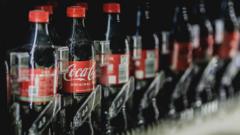As Coca-Cola grapples with the potential implications of a 25% import tax on aluminium, the company's CEO, James Quincey, indicated a possible pivot towards plastic bottles for their beverages. This strategy follows the enforcement of tariffs by former President Donald Trump, which may further escalate the prices of canned goods in the United States. Previously committed to sourcing 50% recycled materials for their packaging by 2030, Coca-Cola has since revised its sustainability goal to 35%-40% by 2035 as environmental groups continue to criticize the company for being a leading plastic polluter.
Coca-Cola Considers Increasing Plastic Use Due to Tariff Impacts on Aluminium

Coca-Cola Considers Increasing Plastic Use Due to Tariff Impacts on Aluminium
Beverage giant Coca-Cola is contemplating a shift toward more plastic packaging if ongoing tariffs on aluminium lead to increased costs for their canned products.
Quincey acknowledged that while packaging costs are relatively minor in Coca-Cola’s overall expenses, heightened aluminium costs might compel the company to emphasize cheaper packaging alternatives, such as plastic. This shift could signal a setback in sustainability efforts as Coca-Cola moves towards a more plastic-centric approach, further intensifying ongoing debates about plastic pollution.
Despite being more environmentally friendly, aluminium cans are often less cost-effective in light of rising tariffs. The situation is compounded by a recent executive order from Trump, rolling back efforts to curtail plastic use in favor of alternatives like paper straws, highlighting the broader context of environmental policy reversals in the current administration.
As Coca-Cola balances business operations with its ecological responsibilities, it remains to be seen how these economic and political challenges will shape their packaging decisions in the future.
Despite being more environmentally friendly, aluminium cans are often less cost-effective in light of rising tariffs. The situation is compounded by a recent executive order from Trump, rolling back efforts to curtail plastic use in favor of alternatives like paper straws, highlighting the broader context of environmental policy reversals in the current administration.
As Coca-Cola balances business operations with its ecological responsibilities, it remains to be seen how these economic and political challenges will shape their packaging decisions in the future.




















